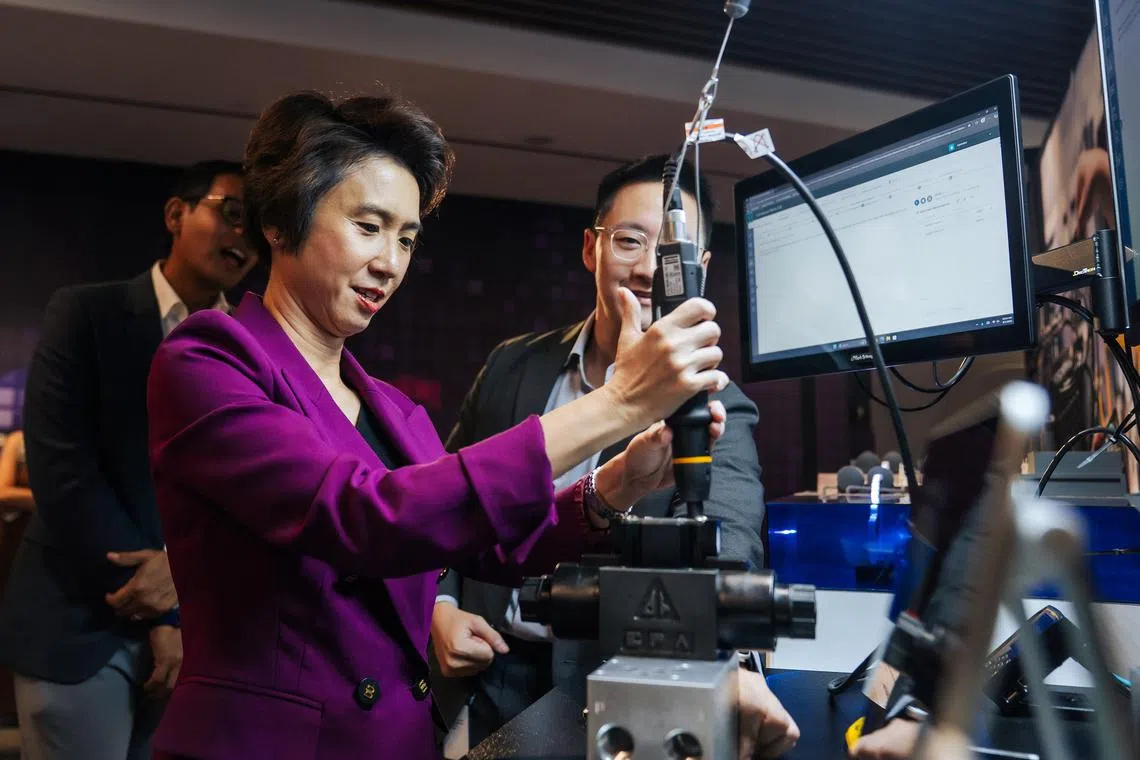Microsoft launches AI accelerator to help firms develop agentic AI road maps
Sign up now: Get ST's newsletters delivered to your inbox

Senior Minister of State for Trade and Industry Low Yen Ling at Microsoft's office on Aug 1 for the launch of its Agentic AI Accelerator programme.
PHOTO: MICROSOFT
SINGAPORE – In the future, when an e-mail from a client on the commencement of a legal suit lands in the inbox of law firm Rajah & Tann, an artificial intelligence (AI) agent programmed to process it can automatically forward it to lawyers with the most relevant experience, suggest key legal issues to be addressed and even draft preliminary legal opinions.
This is an example of how Rajah & Tann partner Rajesh Sreenivasan envisions agentic AI systems could supercharge the firm’s work, and he hopes the company will be able to tap a newly launched AI accelerator programme to do that.
Agentic AI refers to AI systems designed to autonomously make decisions. They can plan and execute complex tasks to meet predetermined goals. An example of this is autonomous driving vehicles.
On Aug 1, Microsoft announced the launch of its Agentic AI Accelerator programme at an event at its office at Frasers Tower.
The programme will offer selected businesses up to $700,000 in services to co-develop their agentic AI road map with technology partners like EY, NCS and Accenture Avanade. Up to 300 local businesses will also receive baseline support of up to $250,000 of Azure cloud credits and AI training and tools.
The AI accelerator programme is part of the Government’s Enterprise Compute Initiative (ECI)
Announced in Budget 2025, the $150 million initiative sees the Government supporting firms by co-funding 70 per cent of consultancy costs, capped at $105,000 per enterprise. Microsoft is the third company coming on board the ECI programme, after Google and Amazon Web Services.
Speaking to The Straits Times on the sidelines of the launch, Mr Rajesh, who also heads his firm’s technology, media and telecommunications practice, said that legal disputes often involve tight deadlines, and the use of agentic AI systems can help lawyers work efficiently under a time crunch.
“An AI agent could be able to evaluate some of the issues (in a dispute) and come up with a draft defence, before actual lawyers come in to properly look into it. Agentic AI systems can become part of a legal team,” said Mr Rajesh, who emphasised that lawyers ultimately have to be responsible for the legal advice.
Microsoft Singapore’s acting managing director Cynthia Yeo pointed out that agentic AI is the next wave of cutting-edge technology. Unlike traditional AI, which waits for human prompts, agentic AI can work alongside people or even independently to complete complex tasks.
Organisations where teams of humans and AI agents work together will be able to scale faster, move with greater agility and create value in new ways, said Ms Yeo.
Microsoft’s Work Trend Index report published in April found that 82 per cent of business leaders intend to deploy AI agents to scale workforce capacity in the next 12 to 18 months.
“The combination of support now available to local businesses through the Government’s ECI and Microsoft’s new Agentic AI Accelerator will drive innovation and position Singapore to lead with AI,” said Ms Yeo.
Senior Minister of State for Trade and Industry Low Yen Ling, the guest of honour at the event, said that as Singapore supports companies in developing cutting-edge AI tools, it has to ensure people are well-equipped to take on the opportunities.
She commended Microsoft for its role in developing AI talent in Singapore, as the company has collaborated with SkillsFuture Singapore to help small and medium-sized enterprises to upskill their workforce in AI.
“For Singapore to thrive in the global economy, we must stay at the forefront of enterprise innovation,” said Ms Low.
“Let us continue to innovate to improve our workplace processes, widen AI technology development and adoption, and upskill our people to remain competitive and resilient. This will allow us to realise the full potential of AI and bring lasting benefits to Singapore.”



